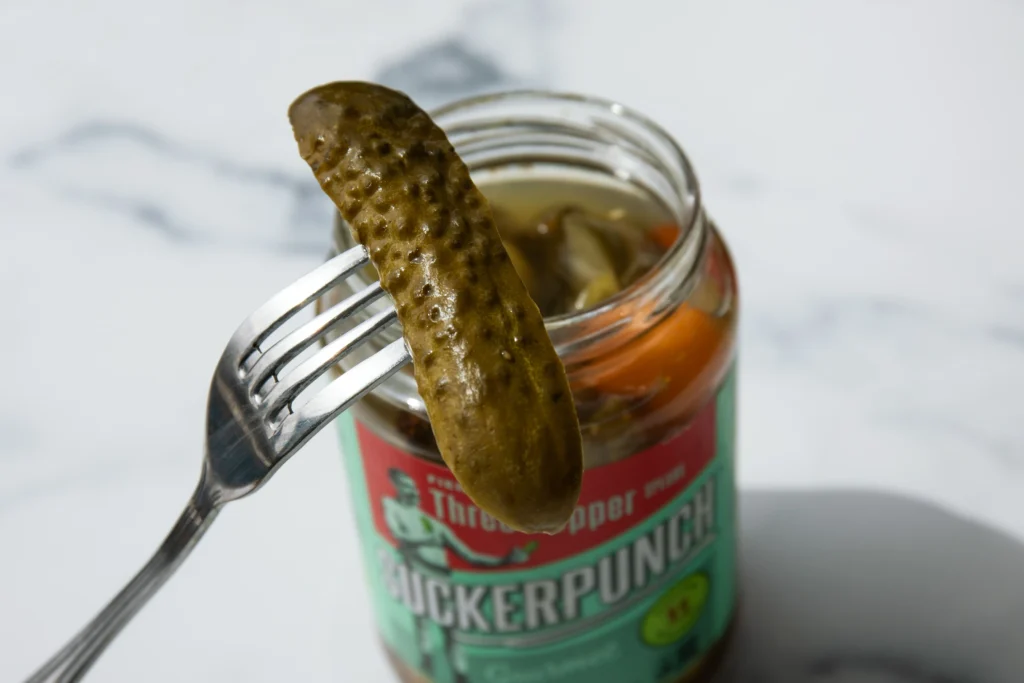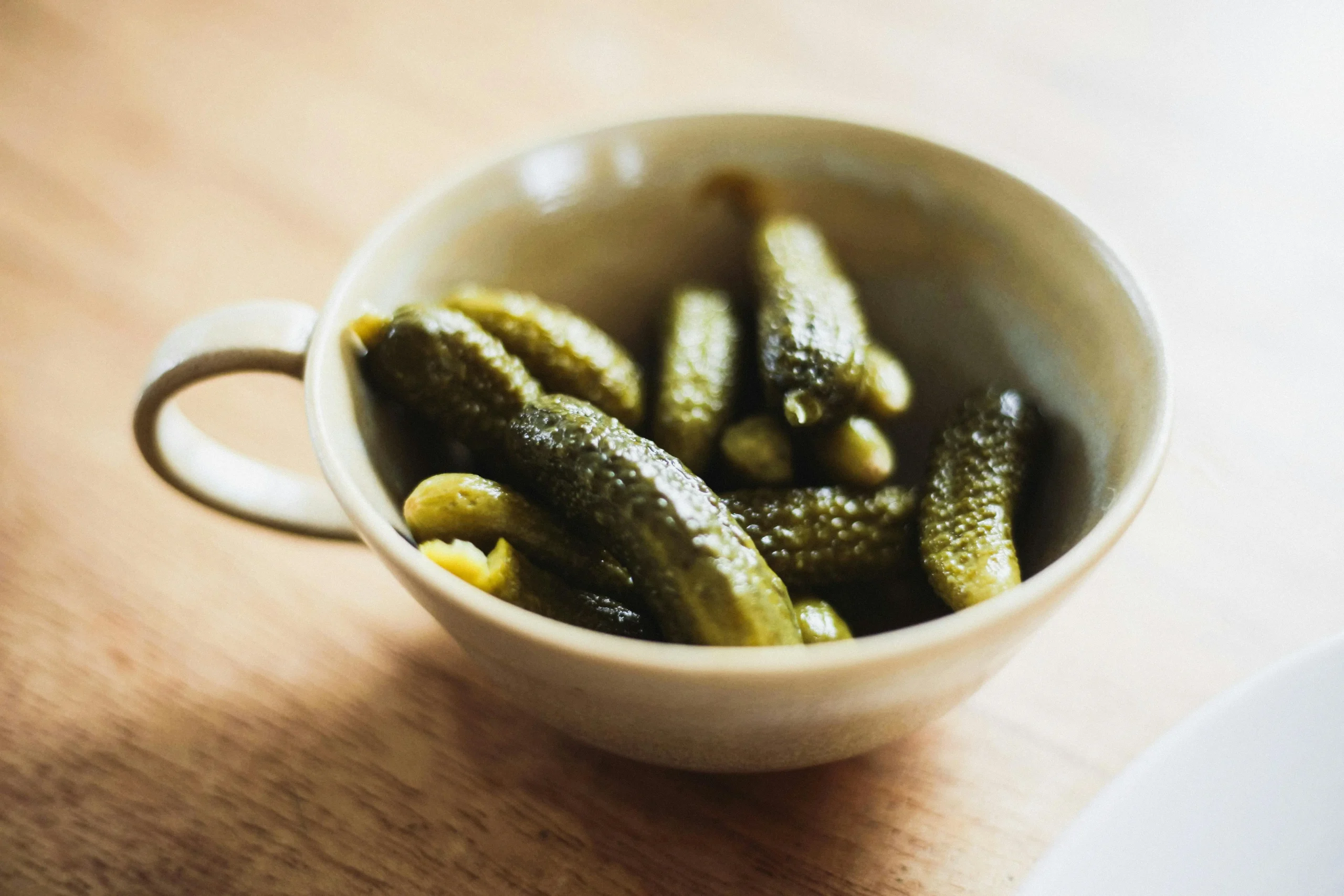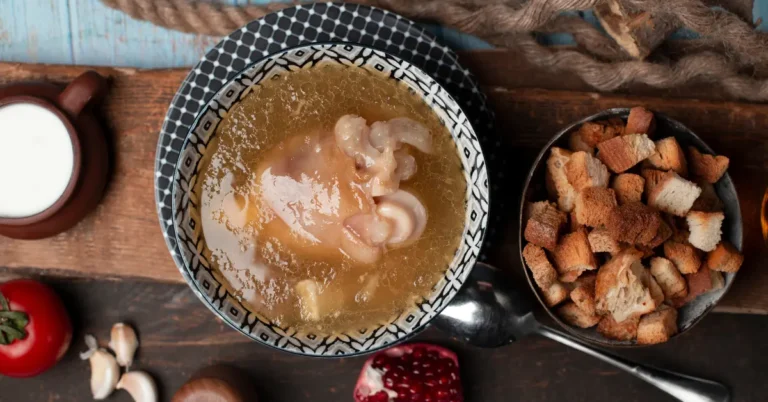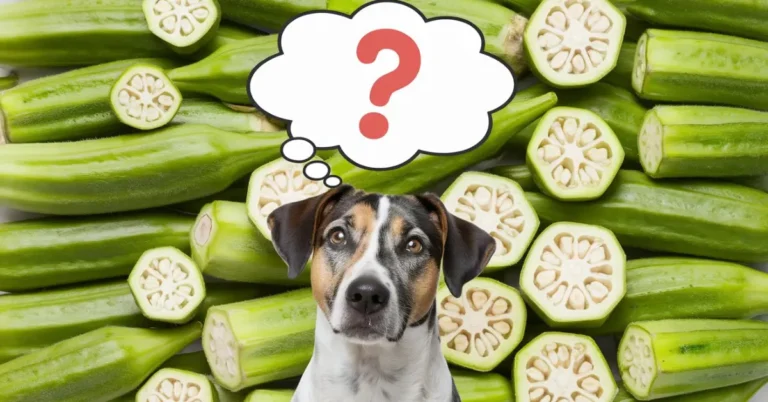Pickles are a crunchy, salty snack loved by many people, and if you’re a dog owner, you’ve probably wondered, “Can dogs eat pickles?” It’s natural to be curious about whether your dog can share this treat with you. However, before you offer your furry friend a bite, it’s essential to understand the potential risks and benefits. In this article, we’ll explore everything you need to know about dogs eating pickles, whether it’s safe, and what healthier alternatives you can give your dog instead.
So, can dogs eat pickles safely, or is this one of those human foods you should avoid giving them? Let’s break it down step by step.
Table of Contents

Are Pickles Safe for Dogs to Eat?
The simple answer is that dogs should not eat pickles. While pickles themselves aren’t toxic to dogs, the ingredients used in the pickling process can pose serious health risks. Most pickles are loaded with salt, vinegar, and sometimes toxic spices like garlic or onions, all of which can be harmful to dogs. So, before you toss your dog a piece of pickle, think again.
Understanding What’s in Pickles
At their core, pickles are cucumbers soaked in a brine solution made from vinegar, salt, and various spices. Here’s a breakdown of the common ingredients and how they affect dogs:
- Vinegar: While not toxic, vinegar is highly acidic and can upset your dog’s stomach.
- Salt: Most pickles contain large amounts of salt, and too much sodium is dangerous for dogs.
- Spices: Many pickles contain spices such as garlic, onion, or mustard seeds, all of which are toxic to dogs.
Even if a small bite of a pickle might not immediately harm your dog, regular consumption or large amounts could lead to serious health issues. So, it’s safe to say that when it comes to the question “Can dogs eat pickles?” the answer leans more toward a cautious “No.”
7 Key Reasons Why Dogs Should Avoid Pickles
1. High Sodium Levels
One of the biggest reasons why dogs shouldn’t eat pickles is because of the high sodium content. Salt is used generously in the pickling process, and while humans can tolerate it in moderation, dogs are much more sensitive to sodium. If dogs eat pickles in large quantities, they can develop sodium poisoning, which can cause symptoms like vomiting, diarrhea, lethargy, and in severe cases, seizures or death.
2. Pickles Contain Toxic Ingredients Like Garlic and Onions
Many store-bought pickles and even homemade varieties contain garlic, onions, or other spices that are toxic to dogs. Garlic and onions can cause anemia in dogs, damaging their red blood cells and leading to fatigue, weakness, and even more severe health complications. Even a small amount of these ingredients can be harmful, so it’s crucial to keep pickles away from your pup.
3. Vinegar Can Cause Digestive Issues
Vinegar is a staple ingredient in pickles, and while it’s not directly toxic to dogs, it can irritate their digestive system. If dogs eat pickles that contain a lot of vinegar, they might experience an upset stomach, including vomiting or diarrhea. Dogs’ digestive systems are not designed to handle high acidity, so it’s better to avoid giving them vinegar-soaked foods altogether.
4. Unnecessary Calories and Preservatives
Pickles often contain unnecessary calories, especially if they are sweet or flavored varieties. Some pickles are made with added sugars, preservatives, and other chemicals that offer no nutritional benefit to your dog. Feeding your dog calorie-dense foods like pickles can contribute to weight gain, which increases the risk of health issues like diabetes or heart disease.
5. Digestive Discomfort
If dogs eat pickles, they might experience digestive discomfort due to the combination of spices, salt, and vinegar. This could result in symptoms like bloating, gas, or even more severe gastrointestinal issues. Dogs’ stomachs are sensitive to highly processed foods, and pickles are no exception. A single pickle might not cause immediate harm, but regular consumption can lead to ongoing digestive problems.
6. Long-Term Health Risks
If dogs eat pickles frequently, they may be at risk for developing long-term health problems. Foods high in sodium can increase a dog’s blood pressure, leading to heart issues over time. Additionally, the frequent consumption of acidic or spicy foods can harm your dog’s kidney function and overall health. It’s essential to consider not just the short-term effects of feeding your dog pickles but also the potential for long-term damage.
7. Safer Alternatives Are Readily Available
With so many healthy snack options for dogs, it’s easy to avoid giving them pickles. While cucumbers are the base for pickles, fresh cucumbers themselves are a far better option for dogs. They’re low in calories, hydrating, and provide a good source of vitamins without the risks associated with pickling.

Are Any Pickles Safe for Dogs to Eat?
You might wonder if certain types of pickles are safer for dogs than others. For example, some pickles are made without garlic, onions, or excessive salt. While these may seem like safer options, it’s still not a good idea to give your dog pickles.
Even if the pickle is free of harmful ingredients, it’s still soaked in vinegar and brine, which can upset your dog’s stomach. If dogs eat pickles regularly, they can suffer from digestive issues or long-term health problems. So, even though some pickles might seem less harmful, it’s best to avoid them altogether.
Healthier Alternatives to Pickles for Dogs
Thankfully, there are plenty of safe and nutritious snacks you can give your dog instead of pickles. These alternatives are not only healthy but also easy to prepare and dog-friendly. Here are a few options:
1. Cucumbers
If your dog is curious about pickles, why not give them a fresh cucumber instead? Cucumbers are a fantastic low-calorie treat for dogs. They are hydrating and packed with vitamins like vitamin K, which supports bone health. You can slice cucumbers into bite-sized pieces and offer them as a crunchy snack.
2. Carrot Sticks
Carrots are another excellent snack for dogs. They are low in calories and rich in vitamins A, C, and K. The crunchy texture of carrots also helps promote dental health by naturally cleaning your dog’s teeth. Best of all, carrots are easy to find and can be served raw or lightly steamed.
3. Apple Slices (Without Seeds)
Apples are a sweet and healthy snack that dogs love. Just make sure to remove the seeds, as they contain cyanide, which is toxic to dogs. Apple slices provide fiber, vitamins, and antioxidants that can benefit your dog’s health.
4. Green Beans
Green beans are packed with fiber and nutrients like vitamins C and K. They are a great low-calorie treat and can be served fresh, frozen, or lightly steamed. Green beans are particularly good for dogs on a weight management plan since they provide bulk without added calories.
What to Do If Your Dog Eats Pickles?
If your dog happens to steal a bite of a pickle, don’t panic. A small amount of pickle is unlikely to cause immediate harm unless it contains garlic, onions, or other toxic ingredients. However, it’s essential to monitor your dog for any signs of distress, such as vomiting, diarrhea, excessive thirst, or lethargy.
If your dog shows any of these symptoms, especially after eating a large quantity of pickles, contact your veterinarian immediately. In cases where dogs eat pickles that contain toxic ingredients like garlic, onion, or excessive salt, the risks can be more severe, so it’s always better to err on the side of caution.

Long-Term Effects of Dogs Eating Pickles
If dogs eat pickles over an extended period, the long-term effects can be detrimental to their health. High salt content can lead to chronic conditions such as kidney disease, high blood pressure, and heart issues. Over time, this could seriously impact your dog’s quality of life. By avoiding pickles and other salty foods, you can protect your dog from these potential risks.
Conclusion: Can Dogs Eat Pickles?
In summary, while pickles are not immediately toxic to dogs, they aren’t a safe or healthy option for your pet. The high sodium content, acidic vinegar, and potential toxic ingredients like garlic and onions make pickles a risky food for dogs. It’s always better to offer your dog healthier alternatives like cucumbers, carrots, or apples that provide essential nutrients without the risk.
When asking, “Can dogs eat pickles?” the best answer is to avoid giving them this salty snack. Instead, stick with fresh, unprocessed foods that your dog will love and that will support their long-term health. And if you’re ever in doubt about what foods are safe for your dog, it’s always a good idea to consult with your veterinarian.
Looking for more advice on what dogs can and can’t eat? Check out our guides on Can Dogs Eat Avocado?, Can Dogs Eat Shrimp?, and Can Dogs Eat Raw Chicken? to learn more about keeping your furry friend safe and healthy.
FAQs
1. Can dogs eat dill pickles?
While dill pickles are a popular variety, they still contain high amounts of salt and vinegar, making them unsuitable for dogs. Even though dill itself is not harmful, the other ingredients in dill pickles can cause digestive upset.
2. What should I do if my dog accidentally eats pickles?
If your dog eats a small amount of pickle, watch for signs of digestive distress such as vomiting or diarrhea. If they consume a larger quantity or if the pickles contain toxic ingredients like garlic or onions, contact your veterinarian immediately.
3. Are there any pickles that are safe for dogs?
Even pickles that don’t contain harmful ingredients like garlic or onions are still high in sodium and vinegar, both of which can cause digestive issues in dogs. It’s best to avoid giving your dog any type of pickle.
4. Can dogs eat sweet pickles?
Sweet pickles may seem like a safer option, but they still contain vinegar and are often made with added sugars and preservatives. These are not beneficial for dogs and could cause digestive problems or contribute to weight gain.
5. Can dogs eat pickles juice?
No, pickle juice is not safe for dogs. It contains a high amount of salt and vinegar, both of which can upset your dog’s stomach and lead to dehydration. Even small amounts can cause digestive distress, so it’s best to avoid giving your dog pickle juice.
6. Can homemade pickles be safer for dogs?
Even homemade pickles can contain too much salt, vinegar, or other ingredients that are not suitable for dogs. If you want to give your dog a crunchy snack, fresh cucumbers are a much safer option.
7. Can dogs eat pickles in a jar?
No, pickles in a jar are usually soaked in a salty and vinegary brine, which can upset your dog’s stomach. The high sodium content and potential toxic ingredients like garlic or onions make jarred pickles unsafe for dogs.





